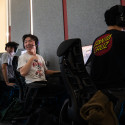Earn-While-You-Learn Program Molds Engineering Careers
Graduating senior T.J. Barnidge won’t have job-search memories of cross-country marauding in a pressed navy-blue suit, or sweaty-palmed tension in the personnel director’s lobby.
He was already doing the job he wanted.
When the UW–Madison mechanical engineer begins his first job in June with Rockwell International, a Cedar Rapids, Iowa avionics firm, he will have a reputation and a niche with the company. Barnidge clocked 15 months of experience with Rockwell through the College of Engineering’s Cooperative Education program.
“It’s been great because I didn’t even have to interview for the job,” Barnidge says. “The co-op was like a tryout for the employer and for me.”
Barnidge is one of hundreds of engineering students making an easier transition into full-time careers through the co-op program. Students gain anywhere from six months to a year of full-time experience with a company, alternating with full-time study.
Co-ops are one of the hottest recruiting tools available to companies, offering them a “grow-your-own” approach to getting new employees in competitive fields like engineering. And students get a real taste of their chosen profession before fully committing to a career path.
At the College of Engineering, nearly 40 percent of all engineering students are participating in co-ops or summer intern assignments, according to Sandra Arnn, engineering career services director. More than 270 companies lined up this year to hire them, including contacts from 120 companies new to the program, she adds.
Most students work a six-month stint with an employer, then return to full-time study in the college. For Barnidge, he says the relationship worked so well he worked parts of three consecutive years with Rockwell.
Barnidge says co-op experiences come with more responsibility than an internship. For Rockwell, he helped design an antenna for the Concorde Supersonic Jet that guards against in-air collisions. Without it, the British planes wouldn’t have been allowed to enter U.S. air space, he says.
In 1996, he helped implement a cursor device for private jets that works like a computer mouse to highlight different navigation controls.
“There were some times when I was sweating,” he recalls. “I knew I was the responsible person. I was getting calls from people on the high end of the food chain.”
The payoff now, he says, is starting in a familiar work environment with a company that appreciates his talents.
John Archambault, director of the Cooperative Education/Intern Program, says market forces are driving its popularity. Companies are having a tough time filling new engineering positions, especially in computer areas, because of the robust job market.
Many companies are moving away from conventional internships, Archambault adds, recognizing that when they hire someone through the co-op, they get a person with a level of experience that allows them to begin producing right away.
As a matchmaker, the co-op program is surprisingly effective. Archambault says 80 percent of all co-op students receive full-time job offers from the employer upon graduation, and about 60 percent accept those offers.
Some students approach the program with reservations about delaying graduation. The average co-op student graduates in five rather than the standard four years. But it’s far from lost time, since it typically brings them better starting wages, more job offers and a greater sense of security about their career choices, Archambault says.
Arnn says the program seems to have academic advantages as well. Many student GPAs have risen after a co-op experience. “Students are sparked by the connection. They see the theoretical knowledge come alive in ‘real world’ applications, and it enriches classroom discussions,” she says.
Building a strong co-op program also helps Arnn’s office gain some consistency in a frequently volatile market like engineering, which she describes as sometimes “feast or famine.” One need only look at the devastating downturn in the late ’80s of the aerospace, automobile and some computer industries to see the boom-and-bust cycle. With the co-op program, the college is building long-term relationships with companies, she says.
Tags: learning



